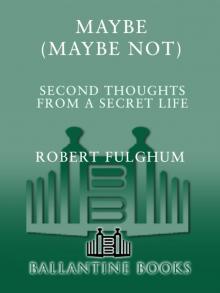- Home
- Robert Fulghum
What On Earth Have I Done?
What On Earth Have I Done? Read online
WHAT ON EARTH
HAVE I DONE?
Also by Robert Fulghum
All I Really Need to Know I Learned in Kindergarten
It Was on Fire When I Lay Down on It
Maybe (Maybe Not)
Uh-Oh
From Beginning to End
Words I Wish I Wrote
True Love
Third Wish
WHAT ON EARTH
HAVE I DONE?
Stories, Observations,
and Affirmations
Robert Fulghum
WHAT ON EARTH HAVE I DONE? Copyright © 2007 by Robert Fulghum. All rights reserved. Printed in the United States of America. No part of this book may be used or reproduced in any manner whatsoever without written permission except in the case of brief quotations embodied in critical articles or reviews. For information, address St. Martin’s Press, 175 Fifth Avenue, New York, N.Y. 10010.
www.stmartins.com
Library of Congress Cataloging-in-Publication Data
Fulghum, Robert.
What on earth have I done? : stories, observations, and affirmations/Robert Fulghum.—1st ed.
p. cm.
ISBN-13: 978-0-312-36549-3
ISBN-10: 0-312-36549-7
1. Life. 2. Fulghum, Robert. I. Title.
BD431.F875 2007
814'.54—dc22
2007020487
First Edition: September 2007
10 9 8 7 6 5 4 3 2 1
Questions asked of children by parents:
“What on earth have you done?”
“What in the name of God are you doing?”
“What will you think of next?”
“Who do you think you are?”
Questions I still ask myself:
“What on earth have I done?”
“What in the name of God am I doing?”
“What will I think of next?”
“Who do I think I am?”
WHAT ON EARTH
HAVE I DONE?
1
Mother Questions
My house in Seattle is across the street from an elementary school. A high fence blocks my view, but I’m close enough to overhear conversations. One morning I was out in my yard at the hour when children were being delivered to school. I heard a car door opened, then slammed shut: KABOOM! Another door was opened, and a woman’s voice came blasting over the fence:
“BILLY . . . WHAT . . . ON . . . EARTH . . . HAVE . . . YOU . . . DONE?”
“Naaannggnnhhh . . .,” wailed Billy-in-the-backseat.
What on earth had Billy done?
Maybe spilled a whole bottle of apple juice or opened his lunch bucket and spread the contents around looking for the cookies.
Or, worse, he had quietly vomited his breakfast all over himself and had taken off most of his clothes. Or picked a scab until blood flowed.
Or used a plastic picnic fork to tattoo his name into the back of his mother’s seat. Or decorated the upholstery and himself with a red magic marker his mother didn’t know he possessed.
Having played both starring roles in this small domestic comedy in my time, I can attest to the possibility that the kid had accomplished all of these moves during the short trip from home to school.
My own mother asked me the same question. Often. And I, in my turn, asked my own children, who, no doubt, have followed the same line of inquiry with their kids.
“WHAT ON EARTH HAVE YOU DONE?”
This is one of the great Mother Questions.
The second great question mothers ask is the theological one:
“WHAT IN THE NAME OF GOD ARE YOU DOING?”
Another Mother Question anticipates the future:
“AND WHAT WILL YOU THINK OF NEXT?”
(My father rolled all these questions into one—only the tone changed:
“WHAT THE HELL . . . ?”)
Children know these questions have no reasonable answers. Any child who has half a brain will go mute or mumble, “Nothing. Nothing.” Or resort to pity-invoking sobs that plead innocence, ignorance, and helplessness:
“I don’t know (snork) I don’t know (snork) . . .”
And the child is telling the truth.
Most of the time a kid doesn’t think about what he’s doing, or why.
This is the privilege of childhood.
Now, at a distance from childhood and parenting, I begin to understand that these Great Mother Questions are, in fact, profound. They are the great Life Questions. Questions of accountability.
Muttering under my breath after yet another screw up, I echo both my mother and father: “What on earth have I done . . . what the hell . . . ?”
When asked of one’s self in a calmer spirit, this line of inquiry makes sense, provokes thought, and even puts my feet back on the right path.
For example: “Well, just what on earth have you done?” After all these years—what? I think it’s useful to inquire of myself about the quality of my existence and my contribution to the commonweal. Never mind what I set out to do. What have I done? What’s my record as a citizen of Earth?
Likewise, “What, in the name of God, am I doing?” queries my actions on behalf of all that I say I believe and hold sacred.
And, finally, the question with ongoing relevance: “What will I think of next?” is a way of asking if my mind is a stagnant cesspool of worn-out notions or if I am mentally active—still replacing archaic information with fresh and better ideas? Am I still thinking—still asking—still learning?
When my mother asked me her questions I hated her.
Her tone of contempt raised blisters on my soul.
Looking back now, what I really hated was knowing that there were no acceptable responses to her inquest. This was not an invitation to a friendly symposium. She wasn’t really asking. She was obliquely declaring that I was a loser, an idiot, and a pain in the ass.
I suppose I was, at least some of the time.
But, then, so was she. Some of the time.
Now I think better of her. And me. And the questions.
So. Energized by my thinking, I hurried around the fence to enlighten the mother who had been whipsawing Billy-in-the-backseat. The kid was gone. The mother was sitting in the car weeping and beating both hands on the steering wheel while muttering to herself.
I remember those parental moments. And this was not the time for the Unknown Wise Man to appear and explain to this vexed lady the deeper meaning of the Mother Questions.
I didn’t want to have to answer that other great Mother Question:
“WHO DO YOU THINK YOU ARE?”
That’s the big one, isn’t it?
A flourishing life depends on how you answer that.
Who do I think I am?
The incontestable truth is that we come and go in sealed solitude. You cannot ever know what other people really think of you. Even your mother did not tell you the truth all the time. And the world will tell you what it thinks you want to hear, not always what you need to know.
What you think of you is what finally matters. When you look in the bathroom mirror in the morning, the court is open for business. And you are the jury and the judge on the case.
“Will the defendant please answer the Mother Questions:
“What on earth have you done?”
“What in the name of God are you doing?”
“What will you think of next?”
And if you know, you can say who you think you are.
2
Solitude
Thoreau’s line is often quoted:
“The man who goes each day to the village to hear the latest news has not heard from himself in a long time.”
As if solitude were a ra
re condition avoided by most people.
But the contrary is true: The man who hears only from himself most of the time, needs to get in touch with the village. Even Henry knew that. He didn’t go very far and wasn’t gone very long. And historians have proved that Thoreau walked the two miles into Concord almost every day, and he welcomed visitors at the pond.
Henry was lonely. That’s why he finally moved back to town.
Solitude is our norm. And it’s often as painful as it is pleasurable, especially if you are depressed or afraid or anguished or confused. Nobody is excluded from feeling left out.
The solution to alone-ness is not more solitude, but companionship and community. And to make inevitable solitude work in your favor.
If you want meaningful solitude, it’s not far away, actually. Retreating to the woods alone isn’t required. In shutting off phones, TV, newspapers, radio, and e-mail, and spending a day inside by myself without background distractions, I often hear from myself.
Sometimes what I hear is good news, but not always. Solitude is hardly guaranteed bliss. Onstage, in the theater of my head, is a noisy company of characters with contradictory opinions and quarrelsome tendencies. One is never really alone, because the play in one’s brain is ongoing, and the clamor can be tiresome, whether you’re asleep or awake.
“Who’s in charge in there.” I often wonder.
In another sense, when I am most alone, I am not alone, alone.
For example, in just an hour’s walk this morning, I counted seventy-three people out by themselves—looking at the news of the day around them—thinking—hearing from themselves. Running, walking a dog, washing a car, or waiting for a bus. Some were out watering their flowers or tending their gardens, absorbed in their own inner process. We smiled, nodded, and acknowledged each other. Sometimes that is enough.
Solitude is not the same as loneliness.
Solitude is a solitary boat floating in a sea of possible companions.
Respect for mutual solitude is a requirement of society.
That’s why Thoreau published Walden—to transcend solitude—to be alone but not lonely. He didn’t keep what he thought to himself. He wrote it down and addressed it to other people in his books.
And that’s why I write all these words to you—as a way of bringing the small boat of my life within speaking distance of yours.
Hello . . .
3
Intersection I
The following essays and stories are a continuation of an account of what on earth I’ve done, what I’ve thought of next, and who I think I am.
My own answers to the Mother Questions are provoked by the events of each day and sorted out in the solitude of my mind. Daily I feel I’m invited to the buffet of the world—a feast offered to the appetite of the imagination. The invitation says, “Help yourself.” And so I have.
My best inclination says, “Share.” And so I do.
Mine is a nomadic life now, seasonally moving between the city of Seattle, Washington, the La Sal Mountains of San Juan County, Utah; and the village of Kolymbari on the northwest coast of the Greek island of Crete. Thus geography frames the thoughts and tales.
Of course there are profound differences between these cultural settings. But profound similarities, as well. Experience emphasizes that, way down deep, people and places are more alike than they are different.
One earth. One species.
Still, the apparent differences shine an enhancing light on what I might miss if I stayed in one place in a rut and never looked up at the scenery or stopped to watch the passing parade.
I try not to look back—that was then. And I try not to look too far ahead—that will come. I concentrate on looking around. Montaigne, who coined the word “essais” and refined the process of taking the ordinary seriously, remains my mentor.
Though edited into this book of stories, observations, and affirmations, the writing usually begins as journal entries—notes to myself—lines of verbal perspectives drawn from walking around and stopping at intersections as I move camp each year.
Often the raw ideas get molded into stories told to my longtime walking companion, Willy, who is probably unaware that for almost three decades he has been my real editor.
In time the stories and reflections migrate into book form. Even so, please keep in mind that I think of what I’m doing as writing letters and postcards to friends, always ending with the unspoken tag line:
“Wish you were here.”
4
View Property
I moved. Keeping my small houseboat on Seattle’s Lake Union as an office and place to write, I migrated to live in a house-house on Queen Anne Hill in a neighborhood of tree-shaded streets perfect for long walks. Proximity to an ice-cream parlor, a sports bar, a coffee house, a wine shop, bakery, barber, grocery store, and butcher shop were also part of the consideration.
Not long after I moved, a real estate agent asked if I was interested in selling my house. Remembering my father’s dictum that, for the right price, everything he had was always for sale, I considered the matter and asked for a formal appraisal of the value of the property. Maybe I would move again.
When I heard the results, the figure seemed low. Less than I paid. What? Why? I asked what the market would consider to be the drawbacks of the house. What diminished its value? Answer: Location issues. A surprise to me, but here’s what the report said:
“The house is across the street from an elementary school, which means noise and traffic during the day. The house is five blocks from a fire station, which often means noise and traffic in the middle of the night. And while the house is on the highest hill in Seattle, it really doesn’t have much of a view. And view on Queen Anne Hill is everything.”
Hmmm. The next day I timed my morning walk to coincide with the period just before the beginning of school, when the playground is full of children at play. I didn’t hear their cacophony as noise, but rather as the jingle-jangle sounds of young life in full cry. I have three hundred young neighbors who are committed to learning—drawing, singing, dancing, writing, reading, math, and history—just to name a few items in their curriculum. And then there are their teachers with their talents and skills and commitments of their own. I see them come early and leave late.
It’s hard to get better neighbors than that.
I say they increase the value of my house.
The school safety patrol is on duty at this hour, so I went to the corner to cross the street instead of jaywalking. A serious young man—fifth-grade caliber—asked me if I wished to cross. He’s wearing an electric-green safety vest and carrying a red flag. “Wait, sir,” he said with authority, “buses are coming.” I waited—while a wave of nostalgia washed over me.
Once upon a time I was the captain of the West Junior High School Safety Patrol of Waco, Texas. A white, military Sam Brown belt, a military-style cap, and a red STOP flag completed the uniform. Five mornings a week, rain or shine, my unit lined up in formation on the school grounds for inspection, raised the American flag, and marched smartly around the school perimeter, dropping off squads of four boys at the corners. The last thing we did every afternoon was lower the flag. We felt important and useful. We were as serious about our responsibilities as the royal guards at Buckingham Palace.
“Sir, are you going to cross or not?”
The impatient fifth grader broke into my memory trance. He held up his hand. “Wait. Car coming.” He looked both ways, boldly marched out into the street, held up his STOP flag, and motioned me on.
When he joined me on my side of the corner, I asked, “Why are you doing this, when you could be up on the school grounds playing basketball?” The look he gave me suggested he thought I was probably even older and more fuzzy-minded than I appeared. “I’m here to protect you, sir.”
Of course. Protect me. I need that.
Five blocks away I passed the local fire station. Two firemen and a firewoman were out front polishing up the big red truck.
I’ve had good feelings about fire stations and the people who work there ever since I was taken on a kindergarten field trip. I suspect that every child in America has had the same experience. The fire station is an educational institution. We take kids there as a way of saying that these people and what they do is good, important, and worthy of respect. They are exemplars. Be like them.
And modern-day firepeople are not at the fire station only in case something’s burning. They’re also emergency medics, trained to deal with injury and death. And they can handle hazardous-material spills and terrorist attacks as well.
I actually like hearing the truck roar by my house with its siren screaming in the middle of the night. It’s the sound of safety. I sleep better knowing the firepeople are five blocks away, protecting me. I say it adds to the value of my house to know somebody will come running in a big hurry when the fruitcake hits the fan. I feel like cheering them on when they pass my house in the big red truck. Hurrah! Go get ’em!
Later, on the way back home, I walked by the fire station again. The truck was gone. I hadn’t heard the siren, so I asked the one fireman I saw where the truck went. “Training session.” Of course. All skills have to be practiced—all certifications renewed—all tool use updated. Their learning is ongoing and never ending.
When I walked by the elementary school again, all was quiet. Through the windows I could see the students at their desks—busy learning. I carefully crossed the street at the corner. I didn’t want a patrol officer to look out the window and see me setting a bad example. I’d hate to be busted.
In my driveway I stopped to consider my morning walk and the real estate appraiser’s evaluation of my house. How can it be said that I don’t have all that much of a view? It is simply not true that you can’t see much from my house.

 All I Really Need to Know I Learned in Kindergarten
All I Really Need to Know I Learned in Kindergarten What On Earth Have I Done?
What On Earth Have I Done? From Beginning to End
From Beginning to End It Was On Fire When I Lay Down On It
It Was On Fire When I Lay Down On It Maybe (Maybe Not)
Maybe (Maybe Not)